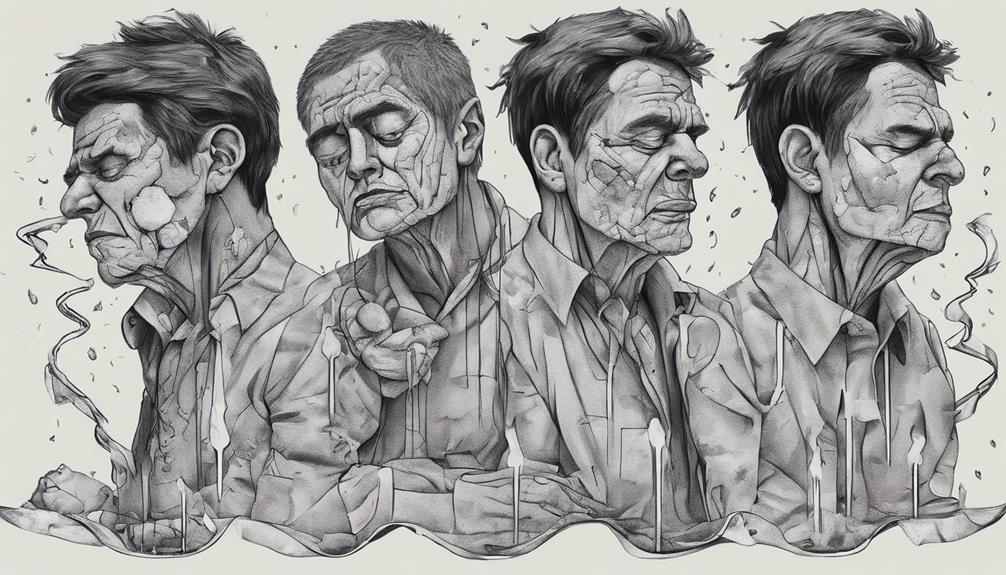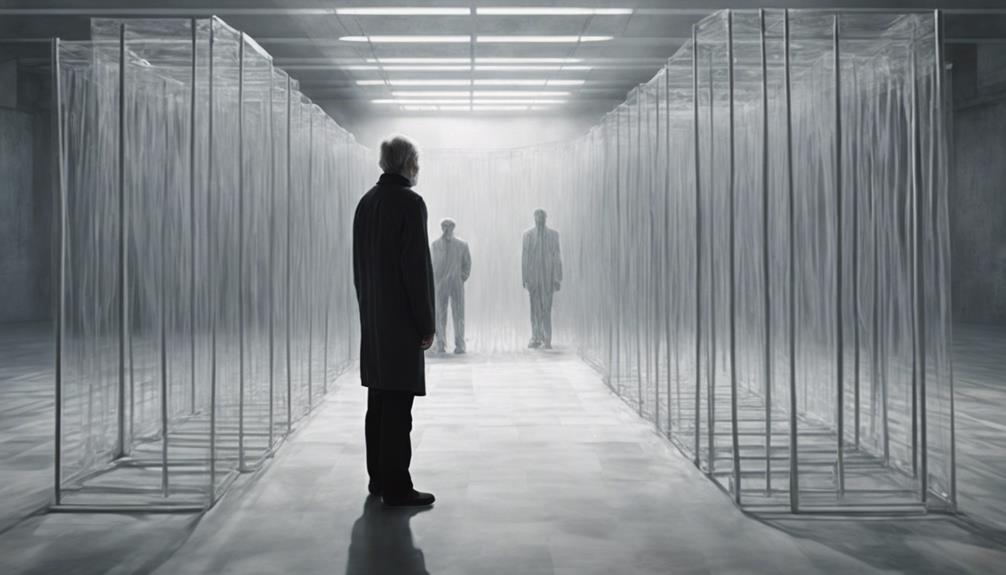The 5 Stages of Grief, by Elisabeth Kübler-Ross, reveal our emotions when we experience loss. They consist of denial, anger, bargaining, depression, and acceptance. Denial is avoiding the truth to shield ourselves, anger requires acknowledging intense feelings, bargaining involves wanting to alter outcomes, and depression and acceptance are typical reactions to loss, with sadness as a common occurrence. If you recognize these feelings, seek someone to talk to. Keep delving deeper to learn more about these stages.
Key Takeaways
- Developed by Elisabeth Kübler-Ross in 1969
- Framework for emotional responses to loss
- Includes denial, anger, bargaining, depression, and acceptance
- Stages may not follow a specific order
- Integral in the grieving process
Overview of the 5 Stages
The 5 stages of grief, developed by Elisabeth Kübler-Ross and introduced in 1969, provide a framework for understanding the emotional responses individuals may go through when dealing with loss. These stages are denial, anger, bargaining, depression, and acceptance, and they play a pivotal role in the grieving process. While they're commonly known as the five stages of grief, it's essential to mention that they may not be experienced in a specific order and can vary for each person.
Denial is often the initial stage, where individuals may struggle to accept the reality of the loss. This is followed by feelings of anger, where one might experience frustration and resentment. Bargaining then comes into play, as individuals may try to negotiate or make deals to change the situation. Subsequently, depression sets in, bringing feelings of sadness and hopelessness. Finally, acceptance occurs, signifying a gradual understanding and coming to terms with the loss. These stages are integral to the grieving process, guiding individuals through the complex emotions that accompany loss.
Denial Stage

Entering the Denial Stage of grief often involves a struggle to grasp the reality of loss. It is a coping mechanism, one where we try to numb the pain by avoiding the truth. During this stage, the world may seem overwhelming and meaningless as we refuse to accept the reality of the situation. Denial serves a purpose in allowing us to survive by pacing the intense feelings of grief. However, accepting the loss and beginning to ask questions marks the start of healing from denial.
| Denial Stage Facts | |
|---|---|
| Coping Mechanism | Numb the pain |
| Avoidance | Refusing to accept |
| Survival | Pacing intense feelings |
| Reality | Beginning to ask questions |
| Healing Process | Accepting the loss |
In this stage, it is essential to recognize that denial is a natural reaction to loss; however, it is also vital to seek help and support to navigate through this stage effectively. Remember, it's okay to take your time, but reaching out for assistance can make the journey a bit easier.
Anger Stage
Moving through the Anger Stage of grief involves acknowledging and processing the intense emotions that arise as part of the healing journey. Feeling anger is a natural response to the intense love and loss experienced during times of grief. This emotion can be directed towards various targets, including oneself and higher powers.
While anger may seem overwhelming, it can also provide strength and structure during times of loss. Expressing anger can serve as a bridge to connection and understanding with others who are also grieving. It's essential to recognize that anger is a valid part of the healing process and should be expressed in healthy ways.
Bargaining Stage

Moving through the Bargaining Stage involves wrestling with the desire to change the outcome of our loss through promises or attempts to undo the reality we face. During this stage of the grieving process, individuals may find themselves caught in thoughts of 'if only,' imagining scenarios where the loss could have been prevented. This can lead to feelings of guilt and self-blame, as they seek ways to alter what's already happened.
Bargaining can offer a temporary escape from the pain of grief, providing a momentary reprieve from the harshness of reality. It's important to note that the bargaining stage isn't always experienced in a linear fashion; emotions may fluctuate, moving back and forth between bargaining and other stages. Understanding the dynamics of the bargaining stage can help us navigate through this phase with compassion and self-awareness, acknowledging the complexities of our emotions during this challenging time.
Depression and Acceptance Stages
Experiencing feelings of emptiness and sadness post-loss is a natural response that individuals may encounter during the grief process. It's important to understand that depression after losing a loved one is a normal emotion, not a sign of mental illness.
The depression stage of grief, as suggested by the Swiss-American psychiatrist Kübler-Ross model, plays a significant role in the bereavement process. Symptoms of depression during this phase may include changes in sleep patterns, energy levels, and feelings of withdrawal.
Seeking bereavement support and acknowledging these feelings can assist in moving through this challenging time. It's crucial to accept the reality of the loss and allow oneself to grieve.
Understanding that experiencing depression after a terminal illness or loss is part of the healing journey can help individuals move towards eventual acceptance and healing. Remember, it's okay to seek help and support during this time to prioritize your mental health and well-being.
Frequently Asked Questions
What Are the 5 Stages of Grief in Order?
We experience grief through Denial, Anger, Bargaining, Depression, and Acceptance. Each stage allows us to process emotions and find healing. Our journey through these stages may not be linear, but they help us navigate loss.
What Is the Hardest Stage of Grief?
Traversing grief together, we find the toughest stage to be acceptance. Embracing the reality of loss, we learn to cherish memories, finding strength in vulnerability. Through support and understanding, we journey towards healing.
How Long Does Each Stage of Grief Last?
Each stage of grief varies in duration for individuals. We can support you through this. Remember, denial may offer temporary relief, anger can subside, bargaining may linger, and depression might need professional care.
What Not to Do When Grieving?
When grieving, we must embrace our emotions, seek support, and allow ourselves the time needed to heal. It's crucial not to suppress feelings, isolate ourselves, rush the process, compare our grief, or turn to substances for relief.
Conclusion
To summarize, the 5 stages of grief provide a framework for understanding and coping with loss. Remember, as the saying goes, 'time heals all wounds.'
It's important to recognize that everyone experiences grief differently and there's no right or wrong way to grieve. By acknowledging and working through each stage, we can gradually come to terms with our feelings and find a sense of peace and acceptance. Some may find solace in connecting with loved ones, while others may need time alone to process their emotions. Implementing healthy coping strategies for grief, such as speaking with a therapist, journaling, or engaging in activities that bring comfort, can aid in navigating the difficult emotions that arise. Ultimately, the key is to allow yourself the space and patience needed to heal at your own pace.
Remember, it's okay to seek support from others during this difficult process.









